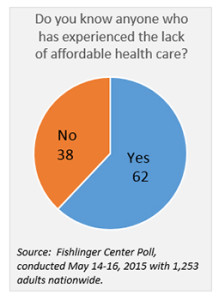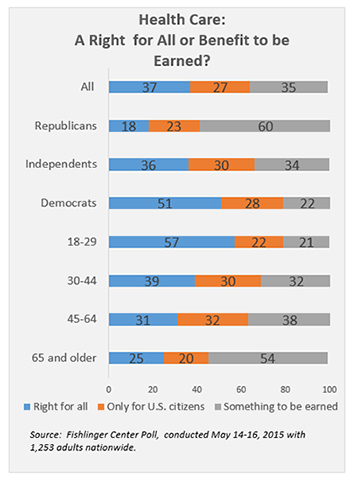Affordable Health Care: A Right or a Privilege?
1/18/2016
The new Fishlinger Center for Public Policy Research at the College of Mount Saint Vincent seeks to foster meaningful dialog on key public policy issues through independent, objective public opinion research. This initial survey focuses on social issues in the United States. This is the second report from the survey; the first report concentrated on human trafficking. Additional reports on other social problems covered in the survey will be released in the coming months.
While there is substantial agreement that a lack affordable health care in the United States is a serious concern, the public is divided on who exactly is entitled to health care. The rising costs of health care is regarded as a widespread problem; nearly two-thirds of Americans know someone personally who has had trouble paying for medical bills.
The poll was conducted online May 14 to 26 with 1,253 adults. Field work was conducted by IPSOS Public Affairs. Blacks, Hispanics, and Asians were sampled at a higher rate than their proportion of the population for reasons of analysis.
The Problem of Affordable Health Care
Three-quarters of Americans see the cost of health care in the United States as an extremely or very important problem. Nearly half (46 percent) of all Americans regard it as an extremely important concern.
The majority of Hispanics (60 percent), Blacks (57 percent), Democrats (57 percent), and adults under 30 (56 percent) describe the lack of affordable health care as extremely important. In comparison, only 44 percent of those over thirty, 42 percent of whites, 38 percent of Asians, and 32 percent of Republicans consider the lack of affordable health care to be extremely important.
Two-thirds of the public considers the unavailability of affordable medical care to be extremely or very widespread in the United States. This view cuts across party, age, and racial groups, although again, blacks, Hispanics, Democrats, and young adults are the groups more likely to say it is extremely widespread.
 This is not surprising when nearly two-thirds of the public knows someone who has trouble meeting the expenses of medical care. At the same time, though, less than half of the public says they feel they know much about this issue. Just over half (54 percent) say they have read a lot or quite a bit about the lack of affordable health care in the United States. Fewer (41 percent) say they feel they know a lot or quite a bit about the problem.
This is not surprising when nearly two-thirds of the public knows someone who has trouble meeting the expenses of medical care. At the same time, though, less than half of the public says they feel they know much about this issue. Just over half (54 percent) say they have read a lot or quite a bit about the lack of affordable health care in the United States. Fewer (41 percent) say they feel they know a lot or quite a bit about the problem.
While most Americans see the lack of affordable health care as an important, serious, widespread problem, less than a third (31 percent) say the issue is being dealt with adequately. Nearly half (48 percent) are lukewarm about the level of focus being given to health care and 21 percent say the problem is not being addressed very well or at all.
Who Deserves Health Care?
At first, about two-thirds of the public said health care is a right for everyone. But asked if that benefit extends to anyone currently residing in the United States, or if it is a privilege reserved for citizens, the public is more closely divided. Nearly four in 10 (37 percent) say health care is a for all residents, about a quarter (27 percent) say it is just for American citizens, and about a third (35 percent) say health care is something to be earned.
Only 29 percent of those with connections to people who have experienced the high cost of health care say it is a privilege to be earned. In comparison, 46 percent of people with no links to the lack of affordable health care say it should be earned.
There are also strong partisan and generational differences, with Republicans and older Americans more inclined to consider health care something that should be earned or worked for.
Liberals overwhelmingly say health care is a right for all; most conservatives believe health care is something that should be earned.
Among those who see the country as being on the wrong track (62 percent) only about a quarter (27 percent) regard health care as a right for all residents.
Survey Methodology
The fieldwork for the Fishlinger Center poll was conducted by Ipsos Public Affairs. Online interviews with 1,253 adults were collected May 14 to 26, 2015. Sampling for the survey used a blended approach, combining the Ipsos iSay panel with Ampario sample (a blend of external panel and non-panel sources). Ipsos measures the precision of its online surveys using a credibility interval to measure sampling error. The survey of 1,253 respondents has a credibility interval of plus or minus 2.8 percentage points. The credibility interval may be larger for subgroups. The poll is subject to other potential sources of error, including, but not limited to coverage and measurement error. Data were weighted to match the national population on age, sex, Hispanic origin, and race. For purposes of analysis, black, Hispanic, and Asian respondents were oversampled. These groups were then weighted down to their proper proportion of the population.
About the Fishlinger Center for Public Policy
The Fishlinger Center for Public Policy Research opened in February 2015 at the College of Mount Saint Vincent. The Center, a member of the American Association for Public Opinion Research (AAPOR), conducts deep and broad studies of public opinion on key public policy concerns through independent and objective research conducted by students, faculty, and other members of the academic community.
By providing a forum for discourse that can stimulate intelligent dialog about issues that deeply affect all Americans, the Center illustrates and enhances the relationship between the work of the College and the common good.
About the College of Mount Saint Vincent
Founded in 1847 by the Sisters of Charity, the College of Mount Saint Vincent offers nationally recognized liberal arts education and a select array of professional fields of study on a landmark campus overlooking the Hudson River. Committed to the education of the whole person, and enriched by the unparalleled cultural, educational and career opportunities of New York City, the College equips students with the knowledge, skills and experiences necessary for lives of achievement, professional accomplishment and leadership in the 21st century.
